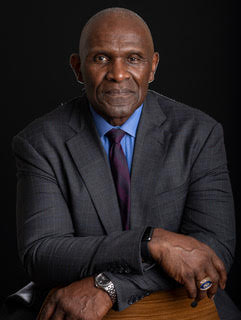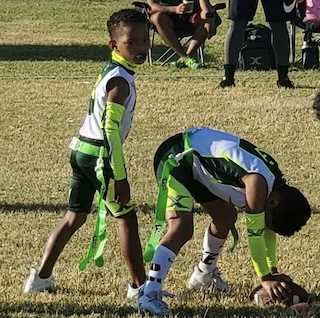Some ex-NFL players are cautious about starting their children in tackle football
By MICHAEL ROVETTO and JUDITH ALTNEU
Capital News Service
Domonique Foxworth played his first organized tackle football game at 10 years old.
Now Foxworth has a son who turns 11 on Super Bowl Sunday and wants to play tackle. Foxworth won’t allow it. His son is playing flag football instead.
When might he allow his son to play tackle? Foxworth said, “We’ll see.”
“It’s definitely not going to be before high school,” said Foxworth, a former NFL cornerback and former president of the NFL Players Association. “I guess that would be the first time that we even consider the conversation. Right now he’s in the fifth grade, so we’ve got some time for him to fall in love with something else.”
Interviews with several former NFL players, some of whom played tackle football before high school, revealed a range of opinions about whether children should participate in tackle leagues.
Some are categorically opposed to youth playing tackle before the age of 12 or 14. Others said they would consider what a child wanted. All interviewed for this article said their thoughts about the sport had evolved since their days as youth players.
“I honestly don’t see the benefit of playing tackle football at a young age because flag football now is so available,” said Muhammad Oliver, a former defensive back who played four years in the NFL.
Oliver said if taught correctly the skills learned in flag football can translate to tackle football. He said flag football allows kids to pick up the fundamentals of the sport and understand how it’s played.
Oliver has seven children, four of whom are boys ages 27, 23, 12 and 9. His oldest son, Isaiah, plays for the San Francisco 49ers. Oliver allowed Isaiah to begin playing in a tackle league at age 8. If he had it to do over again, he said, Isaiah wouldn’t have played tackle football until he was 12.
Oliver said his experience as a youth tackle football coach and as president of NX Level AthletX, a youth multisport development program in Goodyear, Arizona, has influenced his thinking. So has recent medical research linking youth tackle football to later-life challenges, such as impulse control and cognitive decline.
“With all the information now about concussions and how often concussions are happening and the number of concussions that players have had over their lifetime, I just don’t feel like the contact is necessary young,” Oliver said.
Former Super Bowl champion and Hall of Fame linebacker Harry Carson has been outspoken in warning of the risks of brain injury from the sport.

In 2018, Carson was one of the ex-players to appear at a news conference sponsored by the Concussion Legacy Foundation announcing a campaign to discourage tackle football before the age of 14. Carson has repeatedly said in interviews that if he had it to do again, he would not have played football.
Neither of Carson’s two sons played football at a competitive level, he said. Carson, who played 13 seasons for the New York Giants, has discouraged his grandson from playing.
Carson advocates for transparency and education. “I would like for the surgeon general to issue a warning to parents,” he said, adding that adults should understand the risks of the sport.
“Every parent should sign a waiver to fully understand what they are signing their kids up for when they play football or a contact sport,” Carson said.
“Most parents of little boys of color will continue to allow their kids to play,” Carson said, “because, you know, they don’t want to deny their kids the opportunity to play because he has talent … not fully understanding that their kids may suffer the consequences down the road.”
That differs somewhat from the view of Bruce Harper, a former New York Jets running back and kick returner whose NFL career lasted from 1977 to 1984. Harper never had to face a parental decision about youth football. He has two daughters, neither of whom played the sport.
However, Harper said the decision should be left to the child.
“It’s a decision each kid individually has to make. I don’t think the parents should decide for the kid if they can play or not,” he said.
The NFLPA has no formal policy regarding tackle football for kids. However, the players union has backed several youth initiatives including both tackle and flag football. The players union also supports members serving on the boards of USA Football and other youth leagues. Additionally, the union provides financial and community support to players running football camps for kids, but these camps primarily stay away from tackle.
“We encourage every level of football … to implement the health and safety protocols we have at the NFL level,” said George Atallah, the NFLPA’s assistant executive director of external affairs. “We don’t have a specific position on when we think young people should play it. That’s for the medical experts to determine.”
Foxworth, who played for three teams from 2005-2011, sustained many injuries throughout his career. He’s been able to deal with injuries to his body, but brain injury will always be something he’s mindful of.
“I still wouldn’t trade it for the life that I’ve had access to,” Foxworth said of his football career. “But it’s all a different conversation when you start talking about your brain.”

Capital News Service is a student-powered news organization run by the University of Maryland Philip Merrill College of Journalism. With bureaus in Annapolis and Washington run by professional journalists with decades of experience, they deliver news in multiple formats via partner news organizations and a destination Website.

